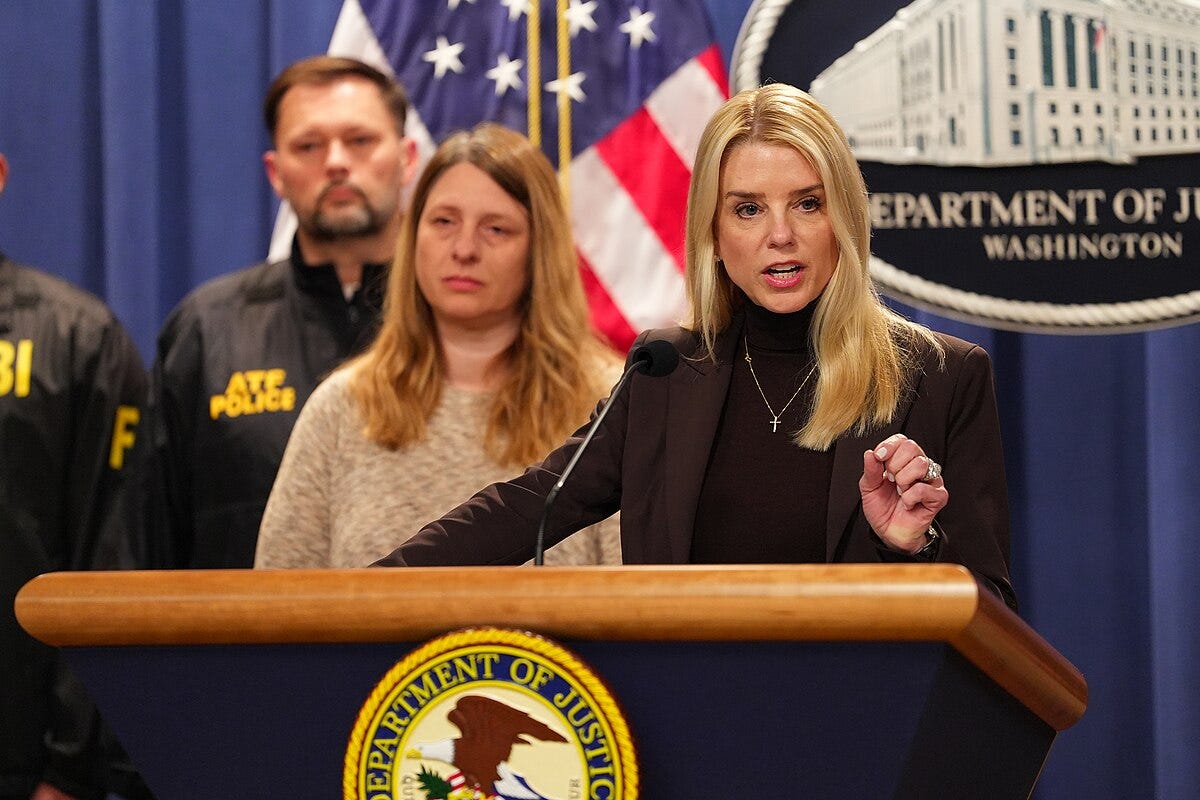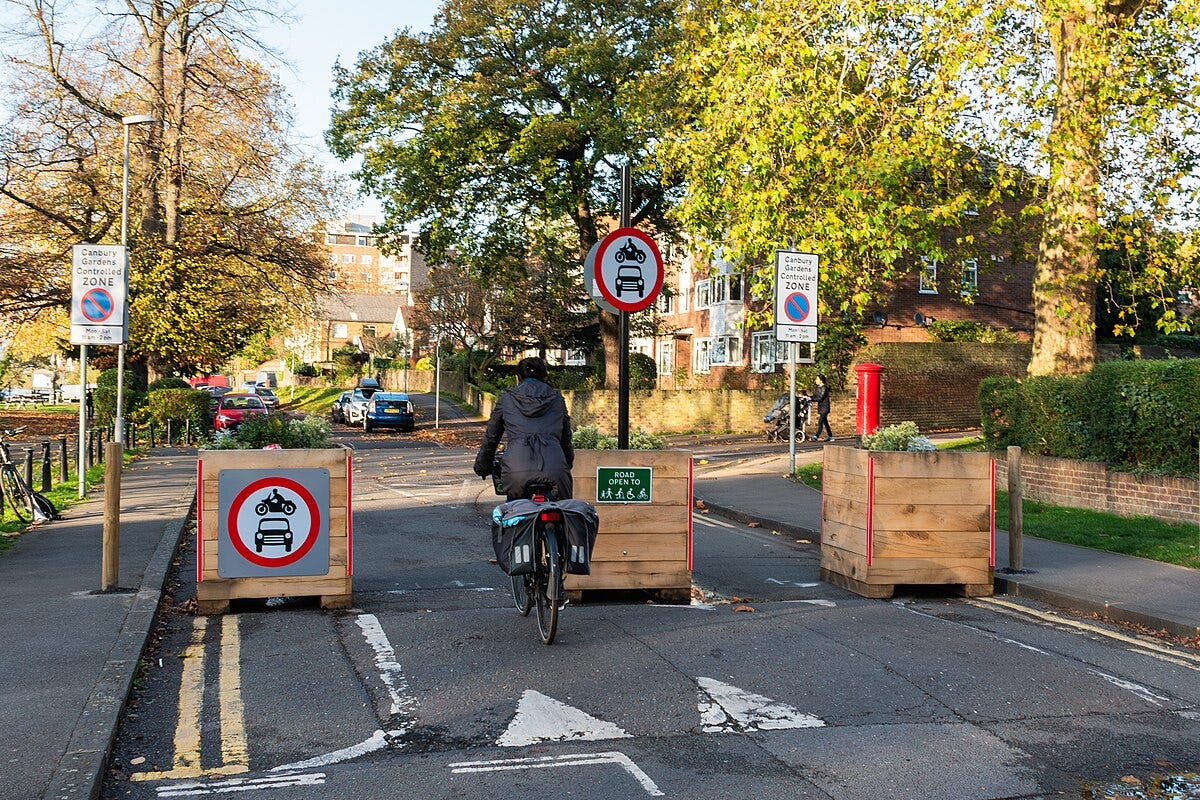News Round-Up: US Flirts with Hate Speech, Censorship, UK Continues Attacks on Free Speech, and France Sees Doubling of Attacks on Police
Every week, the editorial team of Freedom Research compiles a round-up of news that caught our eye, or what felt like under-reported aspects of news deserving more attention.
Over the past week, the following topics attracted our attention:
US Attorney General targets ‘hate speech’.
Jimmy Kimmel pulled off the air on ABC after Charlie Kirk comments.
UK: another absurd police investigation for online postings.
Low traffic neighbourhoods do not reduce car use.
France: violent attacks against police have doubled in a decade.
US Attorney General targets ‘hate speech’
US Attorney General Pam Bondi declared on Monday that her team will “absolutely” target people spewing “hate speech” in the wake of Charlie Kirk’s murder, the NY Post reports. “There’s free speech and then there’s hate speech, and there is no place – especially now, especially after what happened to Charlie – [for that] in our society,” Bondi said on an episode of the “Katie Miller Pod” that dropped Monday. “We will absolutely target you, go after you, if you are targeting anyone with hate speech.”
After facing blowback on social media with critics pointing out that the US First Amendment protects all speech, she felt the need to clarify her statement. “For far too long, we’ve watched the radical left normalize threats, call for assassinations, and cheer on political violence. That era is over,” Bondi wrote on X Tuesday morning. “You cannot call for someone’s murder,” she went on. “You cannot swat a Member of Congress. You cannot dox a conservative family and think it will be brushed off as ‘free speech.’ These acts are punishable crimes, and every single threat will be met with the full force of the law.”

This comes after years of big social media companies targeting free speech on their platforms under the guise of broad definitions such as ‘hate speech’. ‘Hate speech’ has often not meant hateful content but rather the censorship of opinions not aligned with the current paradigm, e.g. people having an unambiguous opinion that trans ideology is harmful to children, or discussing problems related to immigration, etc.
And it would only be fair to point out that Kirk was amongst the critics of such censorship campaigns. “Hate speech does not exist legally in America,” Kirk declared on X in 2024. “There’s ugly speech. There’s gross speech. There’s evil speech. And ALL of it is protected by the First Amendment. Keep America free.”
In addition to vowing to go after hate speech, Bondi railed against people who “say horrible things” and claimed that their employers have an “obligation to get rid of people.”
However, taking this direction would be a huge step back to where we just came from with the censorship industrial complex running at full speed during the Covid crisis. And perhaps openly enforcing a kind of ‘hate speech’ law would go even further than that. It is noteworthy though that the current US administration is right to harshly criticizing European hate speech laws.
Any support for the censorship of one’s opponents feels negligent to the fact that by such act one is also supporting the censorship of oneself, as sooner or later the mechanism will turn back on the censor himself. Is this still comprehensible to people in power, one might wonder, or is it becoming too complicated to understand?
Jimmy Kimmel pulled off the air on ABC after Kirk comments
Jimmy Kimmel’s late-night talk show was pulled from ABC “indefinitely” on Wednesday after he made controversial comments about the assassination of conservative commentator Charlie Kirk, the NY Post reports.
“We hit some new lows over the weekend with the MAGA gang trying to characterize this kid who killed Charlie Kirk as anything other than one of them and doing everything they can to score political points from it,” Kimmel said during his show’s Monday monologue. He continued: “In between the finger-pointing, the White House flew the flag at half-staff, which got some criticism, but on a human level, you can see how hard the president was taking this.” The show then cut to a clip of President Trump being questioned by a reporter outside the White House, where he was asked how he was holding up in the wake of Kirk’s assassination. Trump said, “I think very good,” and then changed the subject to renovations being done to the White House ballroom, before cutting back to Kimmel. “He’s at the fourth stage of grief: construction,” Kimmel quipped. “This is not how an adult grieves the murder of someone he called a friend. This is how a 4-year-old mourns a goldfish. Okay?”
Kimmel’s statement is inaccurate about the background of the supposed killer being MAGA. It is also understandable that the current US administration is not happy about such statements or a big fan of Kimmel’s show, as Kimmel has raged against Trump and his supporters almost every night for a while now on national TV.
“Congratulations to ABC for finally having the courage to do what had to be done. Kimmel has ZERO talent, and worse ratings than even Colbert, if that’s possible,” Trump commented on social media.
It is true that Jimmy Kimmel’s ratings had already been plummeting this year, so using one of his rude and inaccurate rants to take him off might make sense as a business decision. In January the show had 1.95 million viewers compared to 1.1 million in August, representing a 43% drop.
However, the question is whether the decision by the station was made solely by the company or if there was pressure from the administration. Hours before it was confirmed the show was to be taken down, the head of the Federal Communications Commission, Brendan Carr, appeared on Benny Johnson’s podcast and seemed to point to consequences if nothing was done about Kimmel. “This is a very, very serious issue right now for Disney. We can do this the easy way or the hard way,” Carr said. Now he is already talking about investigating other TV shows being “worthwhile.”
On top of that, president Trump said on Thursday that the US government might take broadcast licenses away from news networks that are mostly “against” him. This would be a clear and present step towards censorship.
However, there is also a fair share of hypocrisy involved in the story. Related to the Kimmel case, Democratic leaders Barack Obama, Hillary Clinton, Kamala Harris, and others are now talking about the importance of free speech. Yet this comes after years of suppression of free speech under the Democratic administration under the guise of ‘misinformation,’ ‘disinformation,’ ‘malinformation,’ and ‘hate speech.’ If free speech is really important, how has censorship used to suppress their political opponents and views they personally disagree with been tolerated, or perhaps, at times, even encouraged?
UK: another absurd police investigation for online postings
British police are being accused of yet another ‘dystopian’ attack on free speech after an American woman was threatened with investigation over her posts online, The Daily Mail reports.
Footage of the encounter has been posted online and has been viewed millions of times already.
It shows a woman, named as American cancer patient Deborah Anderson, being confronted in her home in Slough, Berkshire, by Thames Valley Police. She is accused of ‘upsetting’ a person following an allegedly ‘threatening’ post she made on Facebook, which was reported to the police. The officer declined to say which of the alleged posts had been complained about. In the video, Anderson refuses to apologise for her comments online before she is threatened with the potential of a formal interview at a police station.
The incident, filmed in June, prompted an intervention by the Free Speech Union (FSU), which claimed Thames Valley Police had since dropped the case. The officials confirmed no further action was taken over the allegations.
Low traffic neighbourhoods do not reduce car use
London mayor Sadiq Khan’s officials suppressed taxpayer-funded research that showed low traffic neighbourhoods (LTNs) do not reduce car use, after the London mayor spent five years baselessly claiming LTNs are good for the planet, The Times reports.
Emails between Transport for London (TfL) and the university show that officials were concerned about the report’s results coming out. They discussed how they might present the findings in the most positive light, before a decision was made not to publish. In one email, an official reminded others that “all of this stuff is FoI-able” (available under freedom of information laws) before reassuring them that no one outside TfL yet knew about the study.

Funding for the completion of the project was withdrawn in June last year. TfL’s internal “completion statement” explained that the data had failed to offer sufficient new insights. This is despite the groundbreaking finding that LTNs do not reduce car use.
The statement explained that the interim results had not been published because the report was “highly technical”, “full of jargon” and therefore “not accessible to the general public”. Yet in the emails, seen by The Times, officials stated that the report was “easy to follow” and “very well structured and written”.
The research asked more than 4,500 residents about their travel over the previous week and cross-referenced their responses against the percentage of roads that were within LTNs. It found that people in areas with more LTNs had cycled more but that “none of the models show a significant association between the proportion of LTN roads and minutes of past-week car use”. LTNs had no statistically significant effect on walking either.
France: violent attacks against the police have doubled in a decade
France is seeing a wave of extremely violent attacks on French police officers, with two incidents showcasing the risks law enforcement faces, Remix News reports.
Six off-duty police officers were violently attacked by around 10 individuals while they were meeting colleagues for dinner. The incident was caught on film and shows a number of individuals surrounding and beating the officers. The beating took place on September 13-14 in Reims.
Prosecutor François Schneider described the attack as a “lynching.” Two suspects, aged 26 and 27 and originally from Mayotte, an island off the coast of Africa in the Indian Ocean, were arrested on September 15 and will be charged. Prosecutors allege that the perpetrators knew who they were attacking and were purposefully targeting police officers. The officers’ injuries range from 4 to 28 days of temporary incapacity for work, including a broken ankle, a fractured nose, and blows inflicted with a belt buckle.
In a separate attack, a French anti-crime officer was left disfigured. During this incident, the lone officer was surrounded by a pack that relentlessly beat him. A number of suspects have since been arrested, all of them French citizens: Islam S., Sofiane B., Gebril S., Aissa S., and Khadija S.
The beating took place on September 11 in Tourcoing. The officer who serves as an anti-crime squad officer (BAC), suffered a broken nose during the beating. He had intervened on Thursday afternoon during a “scooter theft.” According to the police, the case “involved blackmail, harassment of a kid, a poor kid, who was subjected to terror by a small gang,” as noted by the outgoing Minister of Justice Gérald Darmanin. In other words, the officer was trying to help a youth being targeted by a gang.
These are not isolated incidents, as violent acts against the French police had already doubled over the last two decades previously as well, according to data from 2021.


